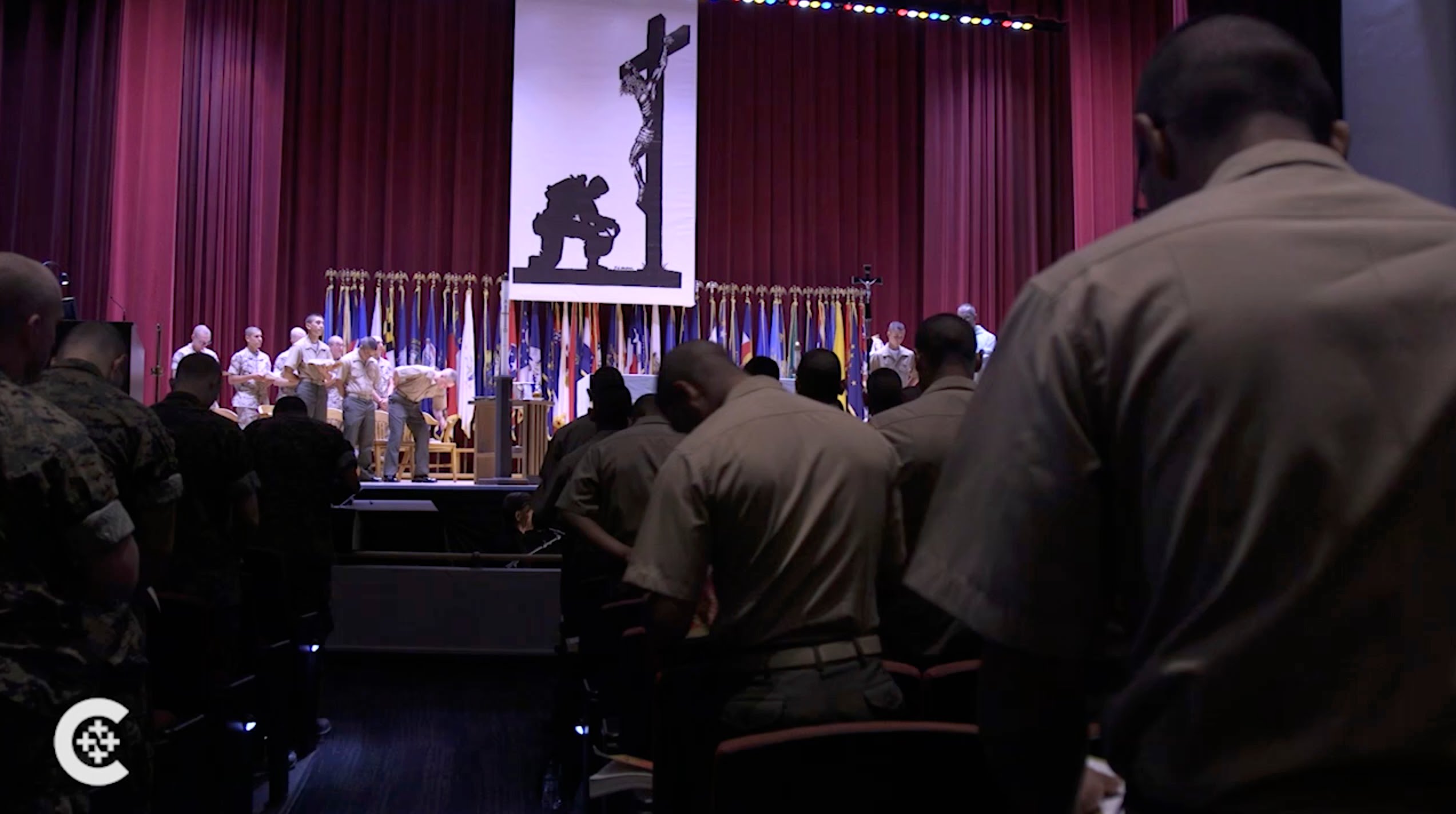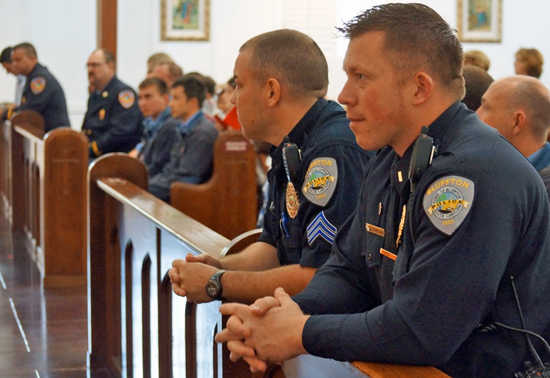
SAN DIEGO—It may sound like an oxymoron, but Father Michael A. Mikstay says some of the most peaceful moments of his military chaplaincy have been spent in a war zone.
Knowing that he is bringing peace, comfort and pastoral care to the men and woman serving their country in a combat zone has given the long-serving Navy chaplain an enormous sense of serenity that mutes the danger, chaos, calamity, casualties and atrocities he has also seen in war.

“There are obviously times when, just like anyone else, we are full of fear for our lives, we’re full of concern that we may not make it back,” Father Mikstay told Catholic News Service as he reflected on his last deployment to Iraq in 2013. “But at the same time, it’s knowing that what we do there is paramount for the spiritual needs for those marines, or any of the services present, that helps us push through that fear.”
Military men and women in a combat zone suffer if they’re not prepared spiritually and knowing that he is able to bring those kinds of provisions to them gives him an inner peace in a place that is anything but serene.
There is no glory in a war zone, said Father Mikstay, who currently serves as a chaplain at Marine Corps Recruit Depot San Diego, and though his role in combat reinforces that he is serving where he is most needed, there is still no mistaking the fact that “war is hell.”
Heavy casualties among soldiers Father Andrew Lawrence knew personally made his last deployment in Iraq, from 2006 to 2008, an emotionally difficult tour of duty, the Army chaplain told CNS during a March interview at Fort Jackson in Columbia, South Carolina.
Those kinds of casualties required the chaplain to celebrate Mass during the memorial services, give last rites to dying soldiers, counsel others with survivors’ guilt and find a way to deal with his own grief.
Because there were so few Catholic chaplains in the country at that time, Father Lawrence also was responsible for the pastoral care of the Catholic military men and women serving in all of southern Iraq, meaning that he was traveling as much as five days a week just to bring them the sacraments.

“It starts to wear you out,” he said. “Emotionally, I was worn out. I had a great chaplain assistant who was able to help me out both physically and emotionally.”
The role of the chaplain assistant is to protect the chaplain while in combat.
Because the chaplain is a noncombat officer and is not permitted to carry a weapon, it’s the armed chaplain assistant who sticks with the priest while he is in the war zone to protect him from enemy forces.
“We’re not directly engaging the enemy,” said Sgt. Dennis Houde, the chaplain assistant assigned to Father Lukasz J. Willenberg, a captain and second battalion chaplain of the 3rd Brigade in the U.S. Army’s 82nd Airborne Division’s 505th Parachute Infantry Regiment located at Fort Bragg in Fayetteville, North Carolina. “We’re just trying to protect the chaplain at all costs.”
But, the chaplain assistant also provides the chaplain with administrative support, is often his eyes and ears among the troops and serves unofficially as a confidant.
“Sometimes the chaplain assistant keeps the chaplain sane,” Father Willenberg said with a smile, “especially in a war zone.”
He needed that kind of support in 2014-15 while he served as a battalion chaplain in Afghanistan.
“Serving in a war zone was truly the most powerful experience of my life,” Father Willenberg said. “Being there for (the men and women) who simply go out there and risk their lives every single day was a privilege.”
To help the soldiers cope with living in a combat situation, Father Willenberg did more than provide religious support, he also planned social engagements, put together a physical training group and organized a marathon.


Father John Reutemann said that his 2015 deployment as an Air Force chaplain in Kuwait and Iraq “sucked, but it was awesome.”
Since he was the only Catholic Air Force chaplain in the region at the time, he spent much of his six-month deployment flying to small bases in both Iraq and Kuwait to celebrate Mass and hear confessions, often coming close to where the so-called Islamic State (ISIS) was reigning terror.
“That part was revolting and exhilarating at the same time,” said Father Reutemann, who is currently serving as a chaplain at Malmstrom Air Force Base in Great Falls, Montana. “Here I am, a Catholic priest, an American chaplain, landing in the cobra’s den. Not just bringing the good news of Jesus Christ, but bringing the value of the First Amendment (of the U.S. Constitution). I’m bringing freedom of expression, freedom of religion, in a region that doesn’t have that guarantee.”
The most important duty for any military chaplain is to nurture the living, care for the wounded and honor the dead.
Giving last rites and watching someone die is always an emotional experience for a priest, but it’s amplified when it’s a member of the military who has died in battle, Father Willenberg said.
“At the same time, it’s humbling,” he said. “Who am I that I’m the comforter for someone who is dying defending his country? Who am I to absolve somebody from sin? You realize that it’s not you doing this. It’s God working through you. It makes that experience even more powerful.”
By Chaz Muth | Catholic News Service
This is the sixth article in a series about military chaplains titled “For God and country”. Read the rest here.
Part 1: For God and country: Priests navigate U.S. military as chaplains
Part 2: Priests see difference in parish ministry and military chaplaincy
Part 3: Military chaplaincy has long history in U.S. armed forces
Part 4: Military families depend on chaplains for more than spiritual guidance
Part 5: Catholic peace activists see conflict in priests serving in military
Part 6: Catholic military chaplains sometimes find peace in a war zone
Part 7: Bishops struggle to balance needs of their diocese and country
Part 8: Military archdiocese gets creative in recruiting Catholic chaplains


